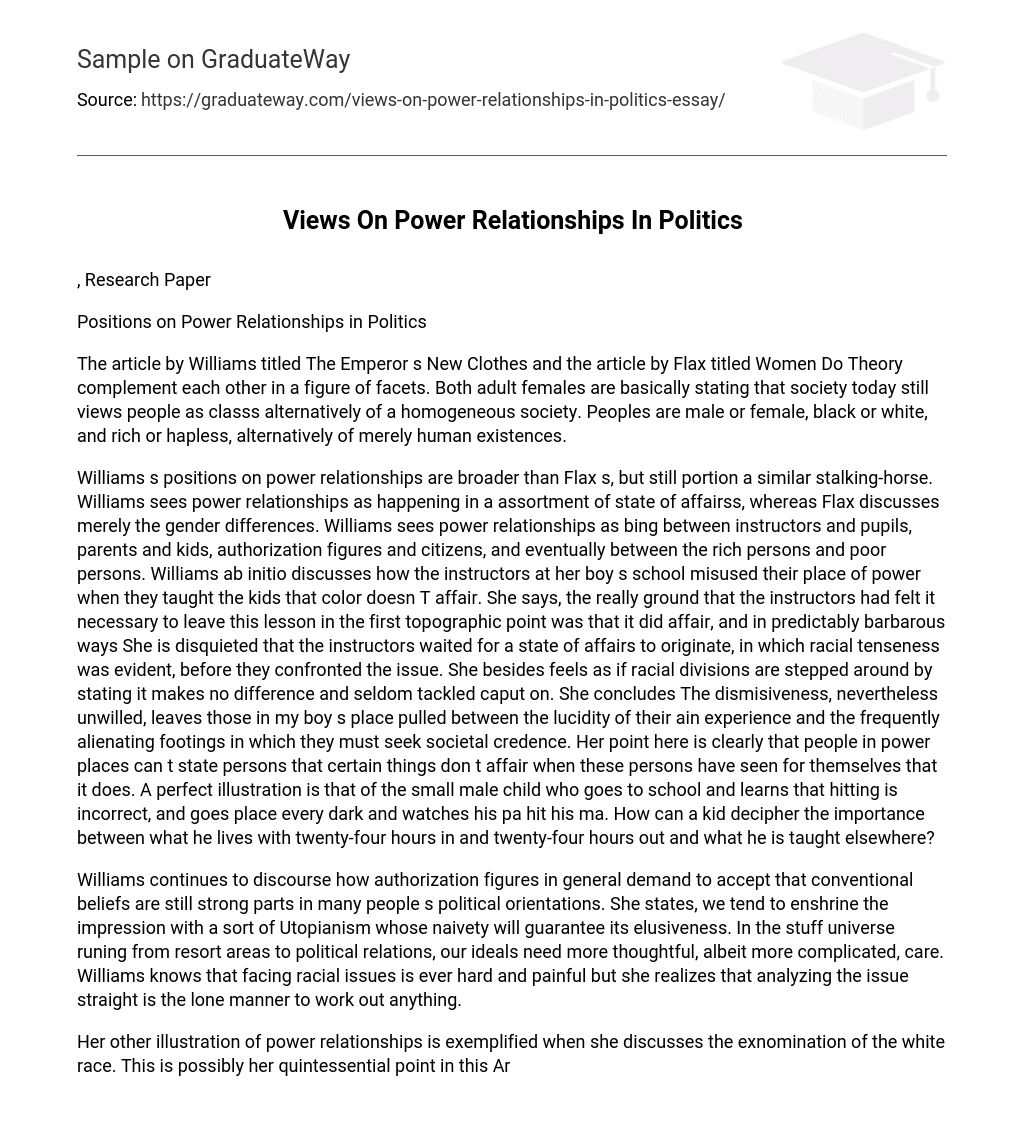The article by Williams titled The Emperor s New Clothes and the article by Flax titled Women Do Theory complement each other in a figure of facets. Both adult females are basically stating that society today still views people as classs alternatively of a homogeneous society. Peoples are male or female, black or white, and rich or hapless, alternatively of merely human existences.
Williams s positions on power relationships are broader than Flax s, but still portion a similar stalking-horse. Williams sees power relationships as happening in a assortment of state of affairss, whereas Flax discusses merely the gender differences. Williams sees power relationships as bing between instructors and pupils, parents and kids, authorization figures and citizens, and eventually between the rich persons and poor persons. Williams ab initio discusses how the instructors at her boy s school misused their place of power when they taught the kids that color doesn’T affair.
She says, the really ground that the instructors had felt it necessary to leave this lesson in the first topographic point was that it did affair, and in predictably barbarous ways She is disquieted that the instructors waited for a state of affairs to originate, in which racial tenseness was evident, before they confronted the issue. She besides feels as if racial divisions are stepped around by stating it makes no difference and seldom tackled caput on. She concludes The dismisiveness, nevertheless unwilled, leaves those in my boy s place pulled between the lucidity of their ain experience and the frequently alienating footings in which they must seek societal credence. Her point here is clearly that people in power places can t state persons that certain things don t affair when these persons have seen for themselves that it does. A perfect illustration is that of the small male child who goes to school and learns that hitting is incorrect, and goes place every dark and watches his pa hit his ma. How can a kid decipher the importance between what he lives with twenty-four hours in and twenty-four hours out and what he is taught elsewhere?
Williams continues to discourse how authorization figures in general demand to accept that conventional beliefs are still strong parts in many people s political orientations. She states, we tend to enshrine the impression with a sort of Utopianism whose naivety will guarantee its elusiveness. In the stuff universe runing from resort areas to political relations, our ideals need more thoughtful, albeit more complicated, care. Williams knows that facing racial issues is ever hard and painful but she realizes that analyzing the issue straight is the lone manner to work out anything.
Her other illustration of power relationships is exemplified when she discusses the exnomination of the white race. This is possibly her quintessential point in this Article. How can everyone experience the same when white people aren t categorized and being of race is what you are if you aren t white. She points out that Exnomination permits Whites to entertain the impression that race lives over there on the other side of the paths, in black organic structures and inner-city vicinities etc. and that the creative activity of a sense of community is a womb-to-tomb dialogue of eternal nuance.
This article has truly opened up my eyes about the current racial state of affairs today. Williams made me recognize that the job and the solution are in everybody s custodies. Parents, instructors, and authorization figures need to give acceptance to the ailments of the past and propose solutions for the hereafter before discord occurs. By conveying to light every facet of the issue openly and candidly you are taking the stigma and the tabu that race issues should be hushed.
Flax s article is more cut and dried than the Williams article. Flax s merely concern in her article is the deficiency of equality between the sexes and the methods that must be employed to eliminate this inequality. Flax, like Williams, believes that historical conventions deeply affect today s mode of thought. Flax states Plato argued that adult females could be philosopher male monarchs since these should be chosen on virtue and no built-in cogent evidence existed that adult females were any less intellectually capable than work forces. Other political theoreticians have argued that adult females can non believe abstractly and has a less developed moral sense. Flax uses this information to reason Thus, portion of the job women’s rightist theoreticians face is taking the general grammer and constructs of traditional theory and using them to adult females and the issues that affect us.
Besides like Williams Flax believes that the household is one of the cardinal interceding constructions between all other constructions of subjugation. Flax believes our hope for an classless society lies in the following coevals. She besides feels that single s internal lives ( where biological and mental lives meet ) must be organized and that gender and gender designation are of import facets in this procedure. Her chief point in this article is that although we will ne’er be able to eliminate differences between the genders, power should be based on accomplishment and non sex.
Flax s article has helped me to recognize that political relations is much more than who gets what, why, when, where, and how. She has made me recognize that people s sentiments and life styles are really runing pots of their ain experiences, what they ve been taught, and changing historical beliefs. The lone manner the power holders in political relations will of all time be able to rectify societies defects are to look at them in the above manner. Correction needs to get down on every degree, with every race, faith, gender, and age group, if they of all time expect it to work.





